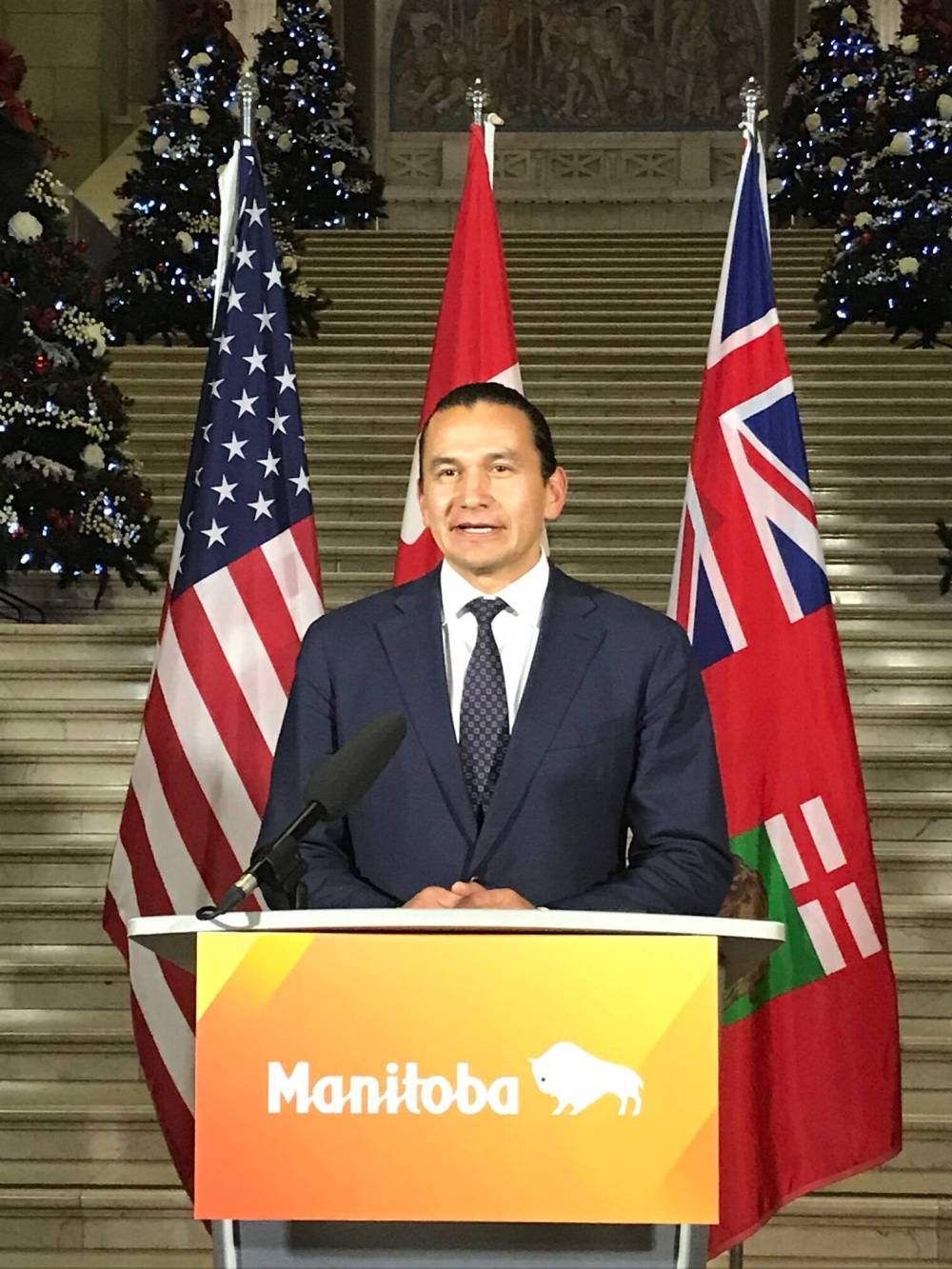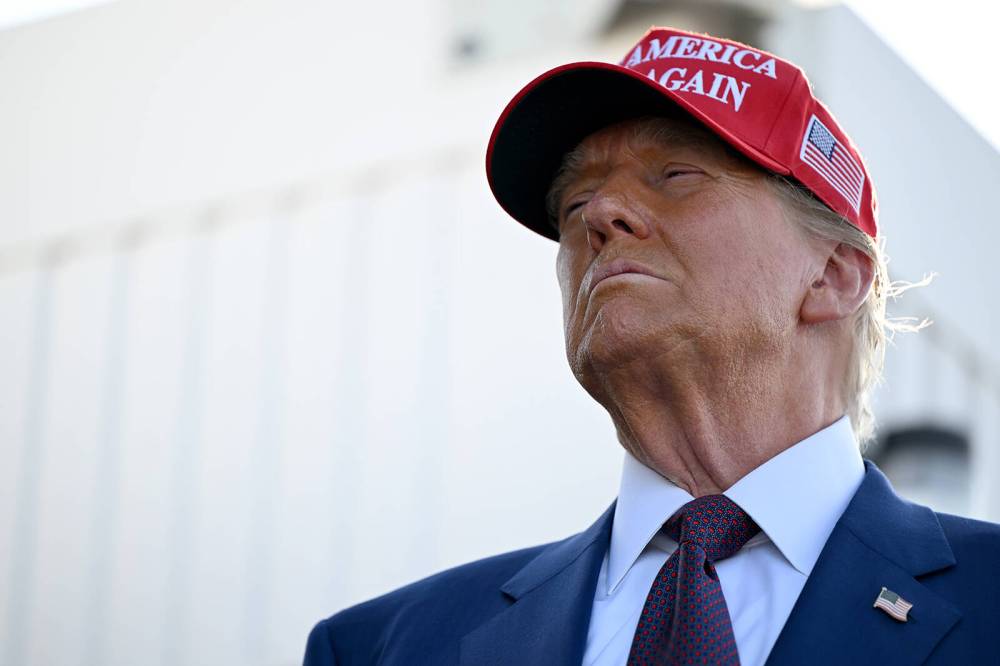Premier Wab Kinew says Canada’s premiers take Donald Trump’s threat of a 25 per cent tariff on exports seriously and are preparing to visit Washington, D.C., after he is sworn in as U.S. president in January.
“I think a lot of the folks who’ve spent time in the Trump orbit are saying that this is for real and we should plan accordingly,” Kinew told reporters late Wednesday.
He had just taken part in an emergency meeting with his fellow premiers and Prime Minister Justin Trudeau on U.S.-Canada relations ahead of the incoming Trump administration.

CAROL SANDERS / FREE PRESS
Premier Wab Kinew discusses a tariff threat by incoming U.S. president Donald Trump Wednesday.
“The message I shared is that we as Manitoba are happy to play a role in a Team Canada unified approach in strengthening our relationship with the United States of America,” he said standing in front of the American, Canadian and Manitoba flags at the legislature.
The premiers are planning a joint trip to the U.S. capital after Trump takes office Jan. 20 to promote Canada’s trade relationship with the U.S., and how citizens on both sides of the border benefit from it, Kinew said.
Deputy Prime Minister Chrystia Freeland, who was also at the emergency meeting, told reporters that now is the time for premiers to put their differences aside and work together.
“I don’t want to minimize for a moment the gravity of the challenge we now face,” Freeland said shortly after the meeting.
She said Canadians should have confidence that while Canada depends on the United States, “the United States also depends on us.”
The premiers also plan to reach out to governors in neighbouring states to remind them of that reality.
“There’s a unified approach across all the premiers that we want to work together on cultivating state-level relationships,” Kinew said. “Trade with Manitoba is good for their home districts.”
Former Manitoba premier Gary Doer, who is Kinew’s special adviser on Canada-U.S. trade, offered his own advice Wednesday.
“Never panic, but don’t rest on any laurels,” Doer, who was Canada’s ambassador to the U.S. from 2009 to 2016, told the Free Press.
Strong trade relationships with state governors will help, said Doer who was in Washington D.C. last week as co-chair of Woodrow Wilson Institute.
“Governors actually have more authority on the economy in their state than senators.”
The people they represent will be hurt by tariffs just as much as Canadians who rely on export industries for their livelihood, Doer said.
The premiers had requested Wednesday’s meeting on Monday — before Trump threatened to impose a 25-per cent tariff on goods shipped to the U.S. from Canada and Mexico. On social media that evening, Trump said the tariffs will be imposed as soon as he takes office and will remain in place until Canada and Mexico stop illegal border crossings and prevent drugs such as fentanyl from entering the U.S.
On Tuesday, Kinew said that a 25 per cent tariff on Canadian exports would result in a recession, and a $2,000 drop in per person GDP. “That’s a huge impact. …That’s something we can’t allow,” he said.
During Wednesday’s virtual meeting, the premier said he spoke up for agriculture as the “backbone” of Manitoba’s economy and pushed for Canada to bolster border security and RCMP funding to crack down on drug trafficking.
“Further investment in the RCMP and law enforcement is something that a lot of the premiers seemed to respond to,” Kinew said. So did the prime minister, he said.
“The federal government indicated to us that there will be more investment coming to the RCMP — particularly in the conversation around how the RCMP can support the border.”
The premier also reiterated calls for Canada to meet it’s NATO commitment to spend two per cent of its gross domestic product on the military.
“This is not just something that shows the Americans that we’re a good partner and an ally when it comes to security and Arctic security, this is something that’s good for our province,” said Kinew, who noted Manitoba is home to military bases and personnel as well as the aerospace industry.
Freeland said there was agreement around the table that it was the time for “everyone to play for Team Canada” — but that unity was being tested even as Freeland spoke.
Ontario Premier Doug Ford, who chairs the premiers council, put out a statement following the meeting that accused the federal government of being flat-footed in the face of Trump’s threat. He said Ontario has pushed Ottawa for months “to show that Canada understands, cares and is responsive to U.S. security and economic concerns.”

Brandon Bell / Getty Images
U.S. President-elect Donald Trump has threatened 25 per cent tariffs on all Canadian exports.
“During this evening’s meeting, I stressed that the federal government has been slow to react and is stuck on its back foot,” said Ford, who joined the meeting from Toronto.
“I expressed my hope that this evening’s meeting is the start of a more proactive approach from the federal government, including by showing that it takes the security of our border seriously by cracking down on illegal border crossings and stopping the transport of guns and illegal and illicit drugs like fentanyl, or risk the economic chaos of Trump tariffs.”
Earlier in the day, Ford said there was not enough funding to properly police the border. Ford said he met with officials from the U.S. Drug Enforcement Administration, the Canada Border Services Agency and Ontario Provincial Police ahead of the meeting.
Quebec Premier François Legault said he asked Trudeau for a plan to secure the border, but came out of the meeting without a “clear answer.”
“I clearly asked Mr. Trudeau to submit a detailed plan to better secure the borders, to avoid Mr. Trump’s 25 per cent tariff,” he said. “I didn’t get a clear answer, but we hope (for it) because there was support from other premiers as well,” he said.
He added: “I don’t think it’s time to play at, ‘Is it true or not that our borders aren’t secure.’”
In a statement issued after the meeting, Alberta Premier Danielle Smith called for the federal government and provinces bordering the United States “to take immediate steps to crack down heavily on these illegal border activities.”
“I communicated this very clearly to the prime minister, and further indicated that Alberta will be acting urgently and decisively to patrol our own shared border with Montana, with more details to be announced soon in that regard.”
Doer stressed Canada needs to walk the talk when it comes to being a good trade partner, and that includes meeting its NATO defence spending commitment of two per cent of GDP right away — and not by the federal government’s 2032 target.
“Everybody’s talking about ‘Team Canada’ diplomatic outreach. But every senator you’re meeting with has got a piece of paper on their desk saying that Canada signed on to NATO and is not fulfilling it,” he said.
“We signed on because it’s good for Canada and it’s good for NATO and we should do it for our own Arctic sovereignty,” said Doer who joined Kinew and a Manitoba delegation of business, labour and industry representatives on a mission to Washington, D.C., in April He’s optimistic Canada will be able to navigate Trump’s second presidency.
“We’ve got an energetic, smart group of elected people in this country in business and labour and citizens,” Doer said.
“We’re smart enough to deal with this and we’ve dealt with problems before. You start off by keeping our own word with our friends south of us and take them on on the basis of merit, not on the basis of emotion.”
Freeland pointed out Americans are heavily dependent on Canada for oil, electricity and critical minerals and metals.
“When it came to the economic relationship, we talked about the fact that trade between Canada and the United States is balanced and mutually beneficial,” Freeland said of the meeting. “Canada is the largest market for the United States by far; larger than China, Japan, the U.K. and France combined.”
Trump has pledged to cut American energy bills in half within 18 months, something that could be difficult if a 25 per cent premium is added to Canadian oil imports. In 2023, Canadian oil accounted for almost two-thirds of total U.S. oil imports and about one-fifth of the U.S. oil supply.
— with files from The Canadian Press
carol.sanders@freepress.mb.ca

Carol Sanders
Legislature reporter
Carol Sanders is a reporter at the Free Press legislature bureau. The former general assignment reporter and copy editor joined the paper in 1997. Read more about Carol.
Every piece of reporting Carol produces is reviewed by an editing team before it is posted online or published in print — part of the Free Press‘s tradition, since 1872, of producing reliable independent journalism. Read more about Free Press’s history and mandate, and learn how our newsroom operates.
Our newsroom depends on a growing audience of readers to power our journalism. If you are not a paid reader, please consider becoming a subscriber.
Our newsroom depends on its audience of readers to power our journalism. Thank you for your support.